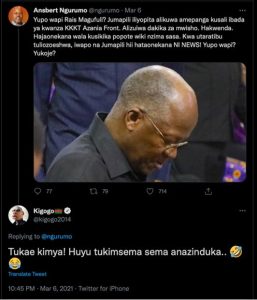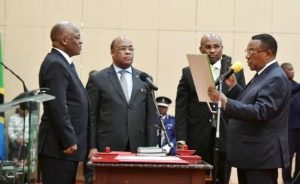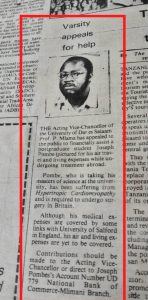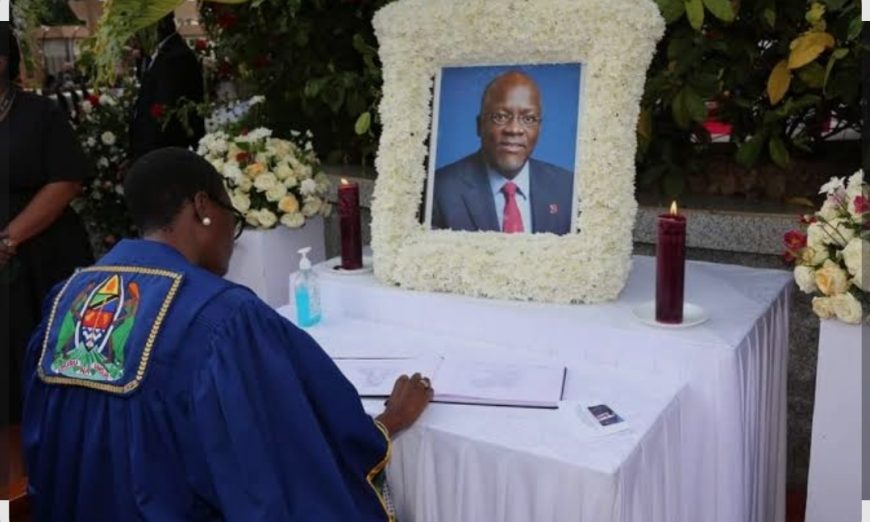WHEN Tanzania’s President John Pombe Magufuli disappeared from public view in late February 2021, the silence was deafening.
For a man who thrived on public appearances and political theatrics, his sudden absence was more than conspicuous. It was alarming.
The country’s state-controlled media and most mainstream outlets had long been suffocated into fear and do-nothingism; only left with the option of sympathetic observers.
They dutifully clung to official handouts that, as it turned out, were misleading them and the nation.
It was not until Saturday, March 6, 2021, that silence was pierced. I tweeted through my Account that Magufuli’s absence was unusual and I challenged the government to explain his whereabouts if he did not appear in church on the second consecutive Sunday.

That single post became the first public media alert on his possible illness.
The following day, when Magufuli did not show up in church, one of the opposition leaders, Tundu Lissu, built on this alert – combining it with his other sources to openly state that the president was sick.
From that point onwards, a storm of speculation engulfed the nation. Get it correct: It had begun with a tweet.
Secrecy, confusion, and contradictions
Between 5th and 17th March of the fateful year, information on Magufuli’s health was treated as a matter of state security. His condition was kept in strict secrecy.
Neither his family nor the vice president was fully informed. Intelligence services orchestrated smoke-and-mirror tactics: the vice president and prime minister were dispatched on state tours to opposite corners of the country, with each of them feeding in contradictory information.
When I and others pressed for answers, the prime minister accused us of telling lies, claiming Magufuli was “healthy and working as usual.” He resorted to intimidation.
Online, Magufuli admirers and zealots of the ruling Chama Cha Mapunduzi party hurled insults and cyberbullying, as some insisted the president was on a “spiritual retreat” and would soon return to humiliate those who dared to make his absence an issue.
But behind the curtains, reality had reigned. Magufuli had fallen critically ill. Rumors about his being flown abroad for treatment were partly true; except that when efforts were being made to admit him at a Nairobi hospital, he was already gone.
Sauti Kubwa’s independent reporting
While mainstream Tanzanian media tiptoed around the issue, my offshore media outlet, Sauti Kubwa, undertook the task of reporting what the public had the right to know.
Our sources, many close to the president’s family, revealed that Magufuli’s condition was aggravated by COVID-19.
Even his wife, Janet Magufuli, was said to have contracted the virus either in Chato – their private home – or in Dodoma at the State House, and unknowingly “passed it on to him.”
Ironically, she too was denied access to him in hospital, just like other family members and close friends.
By mid-March, the state’s grip on secrecy was faltering. Vice President Samia Suluhu Hassan cautiously hinted that the president was unwell. It was a dry statement without details.
On March 17, the truth could no longer be contained. Under pressure from the Chief of Defence Forces – who later admitted to have interrupted senior state officials planning to bypass constitutional order and seize power. Samia Suluhu Hassan announced Magufuli’s death from Tanga, an Indian Ocean coastal city.
The official explanation about the cause of death was cardiac complications, consistent with his history of heart problems. But the broader context told another story: COVID-19 had swept through his close circle.
Ambassador Augustine Mahiga, Chief Secretary John Kijazi, and multiple State House staff had died within weeks.

Even Zanzibar’s First Vice President, Maalim Seif Sharif Hamad, who had visited Magufuli in Chato, contracted COVID-19 and publicly admitted it before his death.
Later, in a tourism interview, President Samia inadvertently confirmed what many already knew; that Magufuli had died of COVID-19. (Mark her confirmation between 3:00 and 3:06 in this video).
Why Polepole’s story rings hollow
Fast-forward to today, former diplomat and CCM loyalist Humphrey Polepole, once one of Magufuli’s staunchest defenders, has resurfaced with a revisionist narrative.
He now carries perforated claims that Magufuli was assassinated by “political enemies within the ruling party.”

Magufuli was one of the most protected men in Tanzania. His meals were carefully prepared, often only by his wife.
His movements were tightly guarded. To imagine that rivals could have poisoned or eliminated him undetected stretches credulity.
Further undermining Polepole’s narrative is what the public witnessed at Kimara locality in the suburbs of the commercial city – Dar es Salaam – at what would become Magufuli’s last public rally.
During his address, he coughed unusually and profusely, so much so that aides had to temporarily take him behind the stage for medical attention.
This episode, combined with reports that his wife Janet had contracted COVID-19 and transmitted it to him, strongly indicates that his illness was viral in origin, and not otherwise.
Several of his close aides had already suffered or died from COVID-19 in the preceding weeks, making the virus the most plausible proximate cause of his death. The Kimara rally thus stands as a public, observable signal of the disease that ultimately claimed his life.
Polepole’s assertions smell more of political malice than fact. They appear aimed at tarnishing his opponents within CCM, reviving factional battles, and rehabilitating the mythology of Magufuli as an indestructible leader who could not have fallen to COVID-19.
It is the same strategy that had animated Magufuli’s supporters in 2021: deny the pandemic, deny the vulnerability, and deny the truth.
But history is not written on the whims of political convenience.
Records show that during his time as a student at the University of Dar.es Salaam, several years ago, the University administration had appealled to the public for financial support towards Magufuli’s medical treatment of his cardiac complications.

The evidence remains compelling: COVID-19 devastated Magufuli’s circle, claimed the lives of his aides, weakened him fatally, and ultimately led to his death.
Why the record matters
The way Magufuli’s illness and death were managed revealed the fragility of Tanzanian institutions under authoritarianism.
A president’s health – a legitimate matter of public interest – was treated as a state security and military secret. Constitutional order was nearly subverted in the panic that followed his passing.
Mainstream media, cowed into silence, relied on official sources that actively lied to them. It was independent voices that cut through the fog. The first alarm was my tweet on March 6, 2021.
The sustained coverage came through Sauti Kubwa and SK Media East Africa, which provided the public with information that the government sought to suppress.
For history, this matters. It shows that even under suffocating regimes, independent journalism can preserve truth against silence and intimidation. It also reminds us that propaganda is not harmless.
The denialism that cost Magufuli his life also cost Tanzania thousands of others, as COVID-19 swept unchecked through communities.
A caution against revisionism
Polepole’s recent narrative is not just inaccurate. It is dangerous. By framing Magufuli’s death as assassination, he feeds conspiracy thinking, erodes trust in institutions, and distracts from the real lesson: that truth, science, and transparency matter in governance.
His words may win applause on social media, but serious minds will recognize them for what they are – a political maneuver. Not history.
For the victims of Magufuli’s denialist policies, for those silenced and bullied for speaking the truth, and for the future of Tanzanian democracy, it is imperative to resist such revisionism.
Magufuli did not fall to an assassin’s bullet or “unholy spirits.” He fell to a virus he denied –shielded by a system that treated truth as treason. From the coughing fit at Kimara to the silence that followed, the signs were there.
And it was independent journalism – not officialdom – that recorded this reality; when others remained helpless on-lookers or were ruthlessly hauled into rude silence.
…………………………………………………………………………….
Revisit other SK Media’s stories on Magufuli’s illness:










